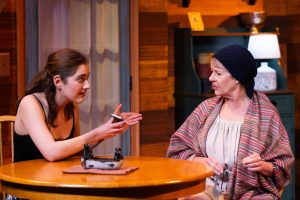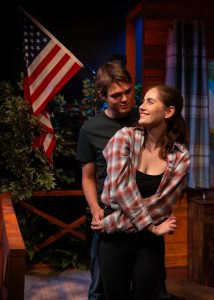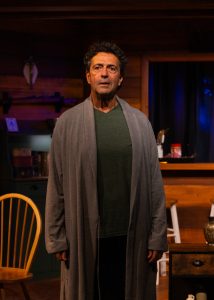
In 1989, Florida Stage introduced us to fledgling playwright Deborah Zoe Laufer and her humorous yet thought-provoking saga of assimilation, The Last Schwartz. Since then, she has produced two handfuls of scripts in South Florida, as well as theaters across the country and around the globe. With her latest effort, The Last Yiddish Speaker, she returns to the theme of Jewish identity in an imaginative though downbeat view of a futuristic, dystopian America. It not only brings her body of work full circle, but is arguably her best play yet.
While set in 2029, The Last Yiddish Speaker may also be Laufer’s most timely tale. For she considers what the result would be if the January 6 attack on the U.S. Capitol and our Constitution had been successful. Wouldn’t it lead to rampant anti-Semitism, vast deportations of non-white residents, unbridled persecution of gays and other minorities and perhaps a curtailing of women’s rights, preventing them from attending college or pursuing professional careers.
At the center of this “what if” dramatization are Paul and Sarah, a father and his teenage daughter, New York Jews forced to flee to a small town upstate and pose as Christians to avoid arrest or worse. Sarah, posing as Mary, is particularly stifled by her new life and is ready to risk all by trying to sneak across the border to Canada, where relative freedoms still exist.
Also in the play is Sarah’s boyfriend John, who works for the government, policing homes for illegal items or, worse, hidden enemies of the people. As much as Laufer strives for a realistic portrayal of the future, she breaks from that approach with the unexpected arrival of a fourth character, a mysterious woman named Chava who claims — quite convincingly — to be 1,000 years old. She is the embodiment of a millennium of Jewish culture and humor, who reawakens in Sarah a yearning for her ethnic heritage, including an embrace of the colorful, but endangered language of her ancestors. (In a standout scene noted for its tension-breaking humor, Chava and Sarah quiz Google Translate for Yiddish synonyms for “penis.”)
Florida Atlantic University Theatre Lab is one of three companies producing The Last Yiddish Speaker as part of a National New Play Network Rolling World Premiere. As she has several times at the Boca Raton venue, Laufer directs her own script, expertly modulating between naturalism and fantasy, high stakes drama and whimsy.
Aiding those dualities is Laufer’s four-member cast, which collectively conveys this dark vision of the future. Foremost among them is area mainstay Patti Gardner as otherworldly Chava. True, she has the best laugh lines, but it is the gravitas she brings to the role that makes her such a standout. Also impressive is Gemma Berg as Sarah, projecting a simmering angst at the strait-jacket her new life binds her in, leading to her inevitable explosion. In direct contrast is Stephen Schnetzer as Sarah’s father, whose priority of keeping Sarah safe leads him to compromise his political compass, much to his daughter’s chagrin. And Gage Callenius (John), making his professional debut, conveys well the tension between his affection for Sarah and his perceived duty to the state.
Now in its 11th season, Theatre Lab has come a long way with its design elements. Scenic Designer Michael McClain’s set for Paul and Sarah’s home is rich with authenticity and character. The same could be said of Dawn C, Shamburger’s costumes, particularly the layers that Chava wears, connoting her various lives over the years. Factor in Thomas Shorrock’s lighting, which completes a theatrical package of a convincing future.
The future looks bright for The Last Yiddish Speaker, even as it foretells the dim future that might have been if January 6th went differently. Subsequent productions are already lined up for next year.
Editor’s note: Because of a production error, this review did not appear before the play’s closing date of Nov. 10. But it is an important review of an important production, and so we publish it now. It is followed by the feature preview of the show, which also did not appear when it should have. It, too, deserves attention, and we recommend it.
***

At the center of Deborah Zoe Laufer’s latest play, The Last Yiddish Speaker, is a horrific “what if.” What, she asks us to consider, if the January 6 insurrection attempt had been successful. Her answer plays out in a dystopic world of 2029, a time when Christian nationalists have taken over the United States, when Jews, gays and non-whites are forced into hiding to save their lives.
“I feel like my job, as lofty as this sounds, is to write about what it means to be alive right now,” says Laufer, who is directing her script at Florida Atlantic University’s Theare Lab, the work’s second-ever production as part of the National New Play Network’s rolling world premiere. “It’s a play that acknowledges what’s happening politically, so the darkness in the play was an inevitability. But within that, it is as hopeful as I could make it.”
She focuses on a father and daughter, Paul and Sarah, New York Jews who have taken refuge upstate in fictional Granville, where they assume Christian identities. Teenage Sarah has attracted a boyfriend, John, who is tasked with rooting out and arresting Jews for detention in camps or execution. And there is a mystical fourth character, a Yiddish-spouting woman named Chava, the embodiment of Jewish culture, who happens to be one thousand years old.
Like many of Laufer’s plays, The Last Yiddish Speaker began when she heard a podcast. Its subject was a now-extinct Hawaiian bird, the kauai’ ō’ō, whose mating call went unanswered. “I was so moved by that, it was the end of a culture, the end of a language,” she says. “Within my sphere I thought of Judaism and Yiddish, which is not really dying out in this country, but is clearly being threatened. I wanted to write about it partly because whenever I want to learn something, I write about it. Then I had to build a world in which Yiddish might not exist, at least not in this country. I did not set out to build a world that was about the insurrection being successful, that was what I sort of backed into.”
Popular area actress Patti Gardner found the role of Chava challenging, since she knew only a few words of Yiddish and is several years short of a thousand. “The first thing I said was, ‘I’m pretty sure I’m going to need a dialect coach. And I’ll stop using moisturizer. I’m in.’ I’ve been a fan of Deb’s plays for a long time. I love that there’s this magical, mystical quality to my character.
“I have some experience with Yiddish-speaking grandparents. Not a lot, but I know some expressions. There’s a maternal quality to her that I can relate to, as a mother and as a daughter and a grandchild,” notes Gardner, adding that the play has “a lot about family and relations, and (Chava’s) on a mission, passing on the culture” and traditions of Judaism before they are lost forever. “She’s passing information on to the daughter, that’s the hook for me because she wants to know, she wants to know the language, she wants to know the history. She’s missing a lot from her own personal life and she’s grabbing onto this being who is giving her something that she doesn’t have.”

Playing Paul will be Stephen Schnetzer, who appeared in a few productions at Florida Stage two decades ago, then left the area and has only recently returned. “Paul is a great challenge for me. I usually play more forceful characters,” Schnetzer notes. “It’s really wonderful to explore someone who’s a little bit lost. And living in terror. It’s such a high-stakes existence. You’re always fearing for your life and, more importantly, for the life of your child. This is as intense as any play I’ve done.”
Laufer was unfamiliar with Schnetzer, but she sensed he was what she was looking for soon after he arrived to audition. “He’s a mensch,” she says, using the Yiddish term for a man of integrity and morality. “His character goes from someone who is really not willing to fight for anything. Y’know, you can fight or you can run. And he was a runner and an assimilator. And through the course of the play, he has to really change and learn and grow. It’s sort of his play, although I say that about each of the characters.”
Although set a few years into the future, The Last Yiddish Speaker seems timely as it arrives here in the final days of the presidential campaign. But Theatre Lab’s artistic director Matt Stabile feels that the play has more to say than its politics. “I don’t think this play’s shelf life is dependent on the election, because I think there are a lot of things that the play discusses will not go away with the election. And we’re not emphasizing the election angle, because it’s exhausting, to be constantly barraged by the election.
“If our job at the theater is to raise conversation, that’s what we always want to do,” he adds. “We never want to be preaching with a play. But saying that the play is political tends to turn people off and not want to come watch it. I think people who come here will want to grapple with these questions, no matter what side they are on.”
“With the backdrop of what’s going on currently and all the tension, the stakes in this play are high,” says Gardner. “And yet there is humor and humanity that comes through that makes it very palatable as an audience member, to sit and watch. Deborah makes it so relatable. And there’s always a surprise, something unexpected.”
Instead of a call to action, Laufer thinks of her play as “a call to conversation. I would like people to go home arguing about it. I think it’s not easily digestible, it takes a long time to really think it through, what you’ve seen. And I hope it stays with people a long time.”